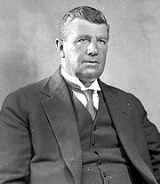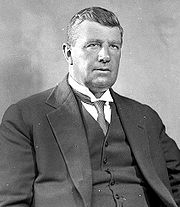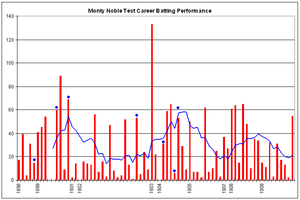
Monty Noble
Encyclopedia
Montague Alfred Noble was an Australia
n cricketer
who played for New South Wales
and Australia. A right-hand batsman, right-handed bowler who could deliver both medium pace and off-break bowling, capable fieldsman and tactically sound captain, Noble is considered as one of the great Australian all-rounders. He scored 13,975 first class runs between 1893 and 1920 and took 624 wickets. He made 37 centuries – including a best of 284 in 1902 – and set several partnership and high-score records for his State team.
He played 42 Tests for his country, and captained the team for 15 of these between 1903 and 1909. Only the 12th captain of his country, he won eight of these games, lost five and drew two. Between his first Test in January 1898 and his last in August 1909, he scored 1,997 runs at 30.25 and took 121 wickets at 25.00. He complemented his only century, 133 in 1903, by scoring 16 half-centuries. Noble played 39 of his 42 Tests against England, and the other three against South Africa.
In later life, he coached and played for club level teams, including Paddington Cricket Club with which he had a long-standing connection throughout his career. He moved from banking to dentistry
, and published his exegesis on cricket, Gilligan's Men. His elder brother, Ted Noble, also played briefly for New South Wales.
on 28 January 1873. He was the youngest of eight sons of Joseph and Maria Noble, who emigrated from Egham
, Surrey
, England
. He "made a name" for himself in in grade cricket
with the Paddington club and first played for New South Wales
(NSW) as a teenager. He toured New Zealand
with NSW in 1893, and in 1894 scored a 152*
against an England touring team under Andrew Stoddart
which drew English attention to his batting. This cemented his place in the state side, and he was a significant contributor to NSW's consecutive Sheffield Shield victories in 1895-96 and 1896-97.
 Over the summer of 1897/98, Stoddart returned with another England team and were defeated in four of the five Ashes
Over the summer of 1897/98, Stoddart returned with another England team and were defeated in four of the five Ashes
Test matches. Noble, whose first-class form had earned him selection, scored 17 in Australia's only innings of 520, then took one wicket as England stumbled to 315 all out. Following on Noble routed the tourists with 6/49. He ended the series with the best bowling averages for both teams. Australia returned to England in 1899, and Noble experienced his first overseas tour. He scored 116 in a warm-up match and "impressed English critics chiefly by his patience and defence." He played in all five Tests, scoring 367 runs at 52.42, with four half centuries, and took 13 wickets at 31.23. At Manchester
he scored 60 and 89, withstanding English bowling for eight and a half hours. Wisden would later record on his death that "his patience equalled his skill in defence, while at times he used his height and reach with full effect in driving, pulling, forcing the ball off his legs, and cutting either square or late - a batsman of rare style and execution without any sign of weakness." He was in particular noted for his ability to cater his technique to English conditions. He was named Wisden Cricketer of the Year for 1900.
Noble faced England in Australia over the winter of 1901/02, scoring 138 runs at 15.33, and taking 32 wickets at 19.00. He then returned to England in 1902 as "the best all-rounder" under Joe Darling
. In a warm-up match at Hove
against Sussex, he scored his career-best 284 in a then world-record partnership of 428 with Warwick Armstrong
. He scored 1,416 runs across the tour, at 32.93, and took 98 wickets, though in the Test series he scored only 129 of these runs at 18.42. 1902/03 saw a further 92 runs at 23.00, including another half-century, and took six wickets.
Noble was elected to the Australian captaincy for the 1903/04 Ashes series, however England were victorious. In 1905 the leadership reverted to Joe Darling for the tour of England, but Australian again lost the rubber. Noble nevertheless scored 2,084 runs at 44.34 across the entire tour. His bowling was viewed as weaker than normal, however Wisden credited his innovative captaincy and field settings. He led his team to England once more in 1909, and reversed a hitherto unsuccessful tour for Australia with innovative captaincy and bowling. In his final Test at The Oval
on 9 August 1909, he scored two and 55, though he went wicketless.
Noble returned to State cricket, where in 1908 a testimonial match at the Sydney Cricket Ground
had earned him £2,000. He continued at New South Wales until 1920, however with seasonal returns of 23, 54, 201, 80 and 13 runs and wicket totals that surpassed two per season only twice in the years either side of World War I
, Noble was passed his prime. He retired in 1920 and moved into banking, and then dentistry. He wrote and published several works on cricket: Gilligan's Men (1925), The Game's the Thing (1926), Those Ashes (1927), and The Fight for the Ashes (1929) and also became a noted commentator and broadcaster. He continued his association with Paddington Cricket Club, and worked for a time coaching junior cricket teams. He died in Sydney
on 22 June 1940, survived by his brother who died a year later.

Australia
Australia , officially the Commonwealth of Australia, is a country in the Southern Hemisphere comprising the mainland of the Australian continent, the island of Tasmania, and numerous smaller islands in the Indian and Pacific Oceans. It is the world's sixth-largest country by total area...
n cricketer
Cricketer
A cricketer is a person who plays the sport of cricket. Official and long-established cricket publications prefer the traditional word "cricketer" over the rarely used term "cricket player"....
who played for New South Wales
New South Wales Blues
The New South Wales cricket team are an Australian first class cricket team based in Sydney, New South Wales...
and Australia. A right-hand batsman, right-handed bowler who could deliver both medium pace and off-break bowling, capable fieldsman and tactically sound captain, Noble is considered as one of the great Australian all-rounders. He scored 13,975 first class runs between 1893 and 1920 and took 624 wickets. He made 37 centuries – including a best of 284 in 1902 – and set several partnership and high-score records for his State team.
He played 42 Tests for his country, and captained the team for 15 of these between 1903 and 1909. Only the 12th captain of his country, he won eight of these games, lost five and drew two. Between his first Test in January 1898 and his last in August 1909, he scored 1,997 runs at 30.25 and took 121 wickets at 25.00. He complemented his only century, 133 in 1903, by scoring 16 half-centuries. Noble played 39 of his 42 Tests against England, and the other three against South Africa.
In later life, he coached and played for club level teams, including Paddington Cricket Club with which he had a long-standing connection throughout his career. He moved from banking to dentistry
Dentistry
Dentistry is the branch of medicine that is involved in the study, diagnosis, prevention, and treatment of diseases, disorders and conditions of the oral cavity, maxillofacial area and the adjacent and associated structures and their impact on the human body. Dentistry is widely considered...
, and published his exegesis on cricket, Gilligan's Men. His elder brother, Ted Noble, also played briefly for New South Wales.
Career
Noble was born in SydneySydney
Sydney is the most populous city in Australia and the state capital of New South Wales. Sydney is located on Australia's south-east coast of the Tasman Sea. As of June 2010, the greater metropolitan area had an approximate population of 4.6 million people...
on 28 January 1873. He was the youngest of eight sons of Joseph and Maria Noble, who emigrated from Egham
Egham
Egham is a wealthy suburb in the Runnymede borough of Surrey, in the south-east of England. It is part of the London commuter belt and Greater London Urban Area, and about south-west of central London on the River Thames and near junction 13 of the M25 motorway.-Demographics:Egham town has a...
, Surrey
Surrey
Surrey is a county in the South East of England and is one of the Home Counties. The county borders Greater London, Kent, East Sussex, West Sussex, Hampshire and Berkshire. The historic county town is Guildford. Surrey County Council sits at Kingston upon Thames, although this has been part of...
, England
England
England is a country that is part of the United Kingdom. It shares land borders with Scotland to the north and Wales to the west; the Irish Sea is to the north west, the Celtic Sea to the south west, with the North Sea to the east and the English Channel to the south separating it from continental...
. He "made a name" for himself in in grade cricket
Grade cricket
Grade cricket is the name of the senior inter-club or district cricket competitions in each of the Australian states. The term may refer to:*Brisbane Grade Cricket *South Australian Grade Cricket League*Sydney Grade Cricket...
with the Paddington club and first played for New South Wales
New South Wales Blues
The New South Wales cricket team are an Australian first class cricket team based in Sydney, New South Wales...
(NSW) as a teenager. He toured New Zealand
New Zealand
New Zealand is an island country in the south-western Pacific Ocean comprising two main landmasses and numerous smaller islands. The country is situated some east of Australia across the Tasman Sea, and roughly south of the Pacific island nations of New Caledonia, Fiji, and Tonga...
with NSW in 1893, and in 1894 scored a 152*
Not out
In cricket, a batsman will be not out if he comes out to bat in an innings and has not been dismissed by the end of the innings. One may similarly describe a batsman as not out while the innings is still in progress...
against an England touring team under Andrew Stoddart
Andrew Stoddart
Andrew Ernest Stoddart was an English cricketer and rugby union player. He was a Wisden Cricketer of the Year in 1893.-Cricket career:...
which drew English attention to his batting. This cemented his place in the state side, and he was a significant contributor to NSW's consecutive Sheffield Shield victories in 1895-96 and 1896-97.

The Ashes
The Ashes is a Test cricket series played between England and Australia. It is one of the most celebrated rivalries in international cricket and dates back to 1882. It is currently played biennially, alternately in the United Kingdom and Australia. Cricket being a summer sport, and the venues...
Test matches. Noble, whose first-class form had earned him selection, scored 17 in Australia's only innings of 520, then took one wicket as England stumbled to 315 all out. Following on Noble routed the tourists with 6/49. He ended the series with the best bowling averages for both teams. Australia returned to England in 1899, and Noble experienced his first overseas tour. He scored 116 in a warm-up match and "impressed English critics chiefly by his patience and defence." He played in all five Tests, scoring 367 runs at 52.42, with four half centuries, and took 13 wickets at 31.23. At Manchester
Manchester
Manchester is a city and metropolitan borough in Greater Manchester, England. According to the Office for National Statistics, the 2010 mid-year population estimate for Manchester was 498,800. Manchester lies within one of the UK's largest metropolitan areas, the metropolitan county of Greater...
he scored 60 and 89, withstanding English bowling for eight and a half hours. Wisden would later record on his death that "his patience equalled his skill in defence, while at times he used his height and reach with full effect in driving, pulling, forcing the ball off his legs, and cutting either square or late - a batsman of rare style and execution without any sign of weakness." He was in particular noted for his ability to cater his technique to English conditions. He was named Wisden Cricketer of the Year for 1900.
Noble faced England in Australia over the winter of 1901/02, scoring 138 runs at 15.33, and taking 32 wickets at 19.00. He then returned to England in 1902 as "the best all-rounder" under Joe Darling
Joe Darling
Joseph "Joe" Darling CBE was an Australian cricketer who played 34 Test matches as a specialist batsman between 1894 and 1905. As captain, he led Australia in a total of 21 Tests, winning seven and losing four. In Test cricket, he scored 1657 runs at an average of 28.56 per innings, including...
. In a warm-up match at Hove
Hove
Hove is a town on the south coast of England, immediately to the west of its larger neighbour Brighton, with which it forms the unitary authority Brighton and Hove. It forms a single conurbation together with Brighton and some smaller towns and villages running along the coast...
against Sussex, he scored his career-best 284 in a then world-record partnership of 428 with Warwick Armstrong
Warwick Armstrong
Warwick Windridge Armstrong was an Australian cricketer who played 50 Test matches between 1902 and 1921. An all-rounder, he captained Australia in ten Test matches between 1920 and 1921 and was undefeated, winning eight Tests and drawing two...
. He scored 1,416 runs across the tour, at 32.93, and took 98 wickets, though in the Test series he scored only 129 of these runs at 18.42. 1902/03 saw a further 92 runs at 23.00, including another half-century, and took six wickets.
Noble was elected to the Australian captaincy for the 1903/04 Ashes series, however England were victorious. In 1905 the leadership reverted to Joe Darling for the tour of England, but Australian again lost the rubber. Noble nevertheless scored 2,084 runs at 44.34 across the entire tour. His bowling was viewed as weaker than normal, however Wisden credited his innovative captaincy and field settings. He led his team to England once more in 1909, and reversed a hitherto unsuccessful tour for Australia with innovative captaincy and bowling. In his final Test at The Oval
The Oval
The Kia Oval, still commonly referred to by its original name of The Oval, is an international cricket ground in Kennington, in the London Borough of Lambeth. In the past it was also sometimes called the Kennington Oval...
on 9 August 1909, he scored two and 55, though he went wicketless.
Noble returned to State cricket, where in 1908 a testimonial match at the Sydney Cricket Ground
Sydney Cricket Ground
The Sydney Cricket Ground is a sports stadium in Sydney in Australia. It is used for Australian football, Test cricket, One Day International cricket, some rugby league and rugby union matches and is the home ground for the New South Wales Blues cricket team and the Sydney Swans of the Australian...
had earned him £2,000. He continued at New South Wales until 1920, however with seasonal returns of 23, 54, 201, 80 and 13 runs and wicket totals that surpassed two per season only twice in the years either side of World War I
World War I
World War I , which was predominantly called the World War or the Great War from its occurrence until 1939, and the First World War or World War I thereafter, was a major war centred in Europe that began on 28 July 1914 and lasted until 11 November 1918...
, Noble was passed his prime. He retired in 1920 and moved into banking, and then dentistry. He wrote and published several works on cricket: Gilligan's Men (1925), The Game's the Thing (1926), Those Ashes (1927), and The Fight for the Ashes (1929) and also became a noted commentator and broadcaster. He continued his association with Paddington Cricket Club, and worked for a time coaching junior cricket teams. He died in Sydney
Sydney
Sydney is the most populous city in Australia and the state capital of New South Wales. Sydney is located on Australia's south-east coast of the Tasman Sea. As of June 2010, the greater metropolitan area had an approximate population of 4.6 million people...
on 22 June 1940, survived by his brother who died a year later.


